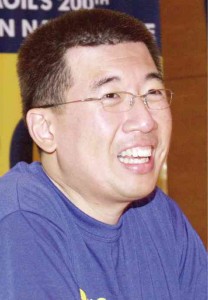Seaoil strives to put people first, ensure growth
For far too many corporations in the Philippines, employees are mere cogs in the wheel, automatons with no hearts and minds that exist for no other purpose than to help the owners earn more money year after year.
Seaoil Philippines Inc., one of the first petroleum product distributors to enter the market after the industry was deregulated in 1998, strives to separate itself from the rest by treating its employees as more than just salaried workers but real people with dreams and aspirations that the company can actually help fulfill.
“Our approach is a little different. We run our business in more holistic manner,” explains Seaoil CEO Glenn Yu, “This means we are not just responsible for people financially.”
“The norm is that the relationship is limited to salary. If you work, then we meet our financial obligation. But in our view, we are also responsible for them in terms of their emotional well being, intellectual growth, especially since people spend most of their time at work,” Yu adds.
This policy is enshrined in Seaoil’s mission statement, which says that Seaoil is a mere steward of its reputation as well as its customers and employees.
“If you are going to be a steward, then you have to view people as people who have needs aside from financial needs,” Yu says, “In recent history, people want to do a bifurcation of work and life. But the reality is that they do mix, the reality is that you cannot just leave work at work and family at home.”
Confronted by this reality, Seaoil invested in employee development programs such as spiritual counseling, financial planning and career mentoring. These are on top of so-called “hard” skills such as how to read financial statements and how to handle difficult customers.
“We want the people who work with us to have a sense of purpose, to be proud to work for the company and appreciate the values of the company,” says Yu, “We are very intentional about it. We are perhaps one of the very few organizations in the industry that use a strength finder. We want people working for us to know their strengths and develop them.”
Using psychometric tests, Seaoil employees are classified according to their predominant traits. Some are learners while others are achievers. Some are activators, while others are comfortable in leadership positions.
Through this system, Seaoil can make better sense of its career development program and can put people in the place where they can be most productive, and at the same time most fulfilled. With this system, the company believes it is able to focus more on strengths rather than the weaknesses.
Yu says that according to research that the company has come across, only 19 percent of employees actually use their strengths at work, which means that the rest of the people are either working on something they are not good at, or are unfulfilled because they are not doing what they really want to do.
“We have made a lot of organizational changes to make people excel and have a better fit. Sales people, for example, will likely come from those in the influence quadrant because they are likely to have better communication skills and better at winning others over,” says Yu.
Time and resources so far spent on retooling the organization according to the strengths finder have been considerable, but Yu says that the returns are tangible.
In Seaoil, for example, the annual employee turnover is only 3-5 percent, much lower than the corporate average of 9-13 percent. This translates to savings on hiring and training costs as well as enhanced capability to pursue long-term goals.
“When we hire, we hire for the long term,” says Yu.
At Seaoil, Yu says that employees also get the chance to have their day with the founder of the company—Glenn’s father, Francis—who started working when he was 17 and was 33 years old when he finally graduated with an engineering degree because he had to work and study at the same time.
Yu says that the hope is that the employees can be inspired by his example, since he was once just like them, with dreams of having a better life. Yu adds that his father always talked about the value of education, saying that it can never be taken away.
Yu says the day with the chair was just one of the unique facets of the organization that he hopes will attract hardworking employees to Seaoil and encourage them to stay.
Seaoil will need these people as soon as possible as it is on a rapid expansion mode, with plans to open another 70-80 gas stations within the year to add to its network of 250 outlets.
“We are hiring like crazy right now all across the spectrum, from the service crew to the cashiers in our stations to retail officers and accountants. We are just growing, and I think part of the reason is that people are starting to recognize that we are a different company and that we are serious about protecting our integrity,” says Yu.

